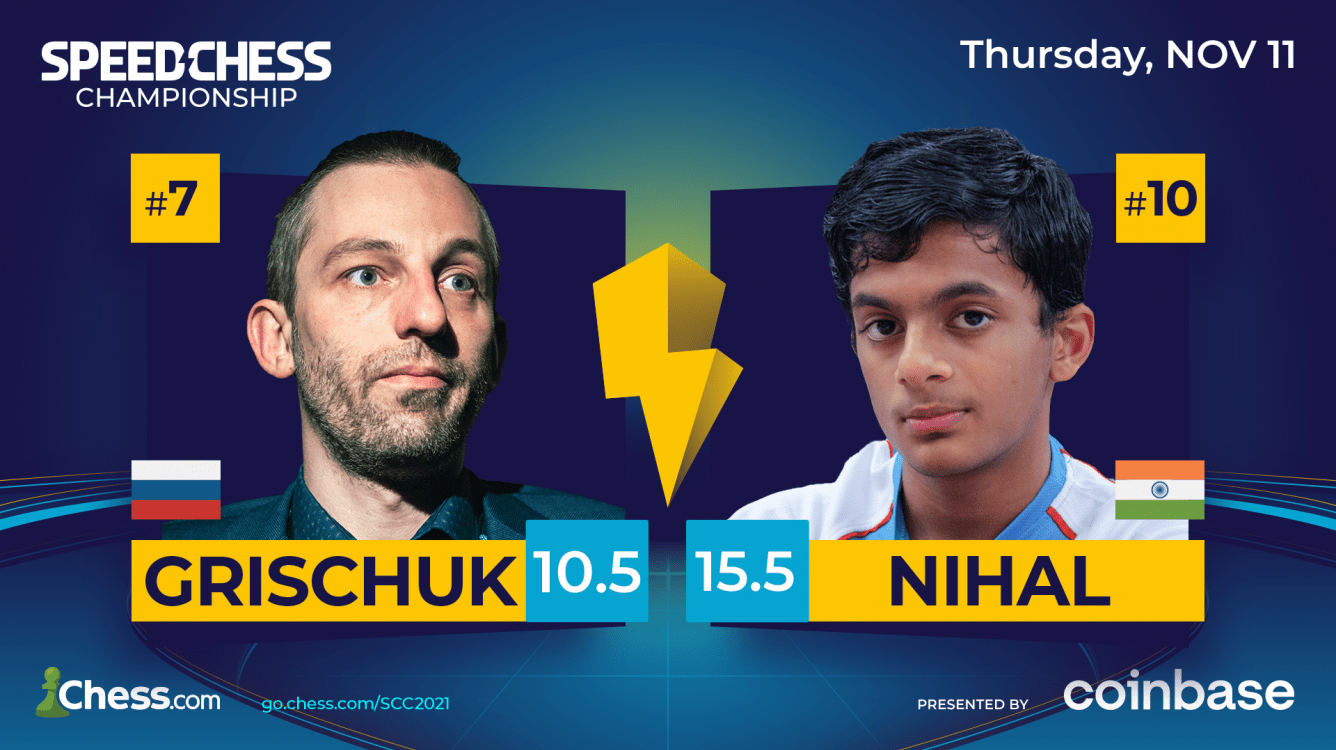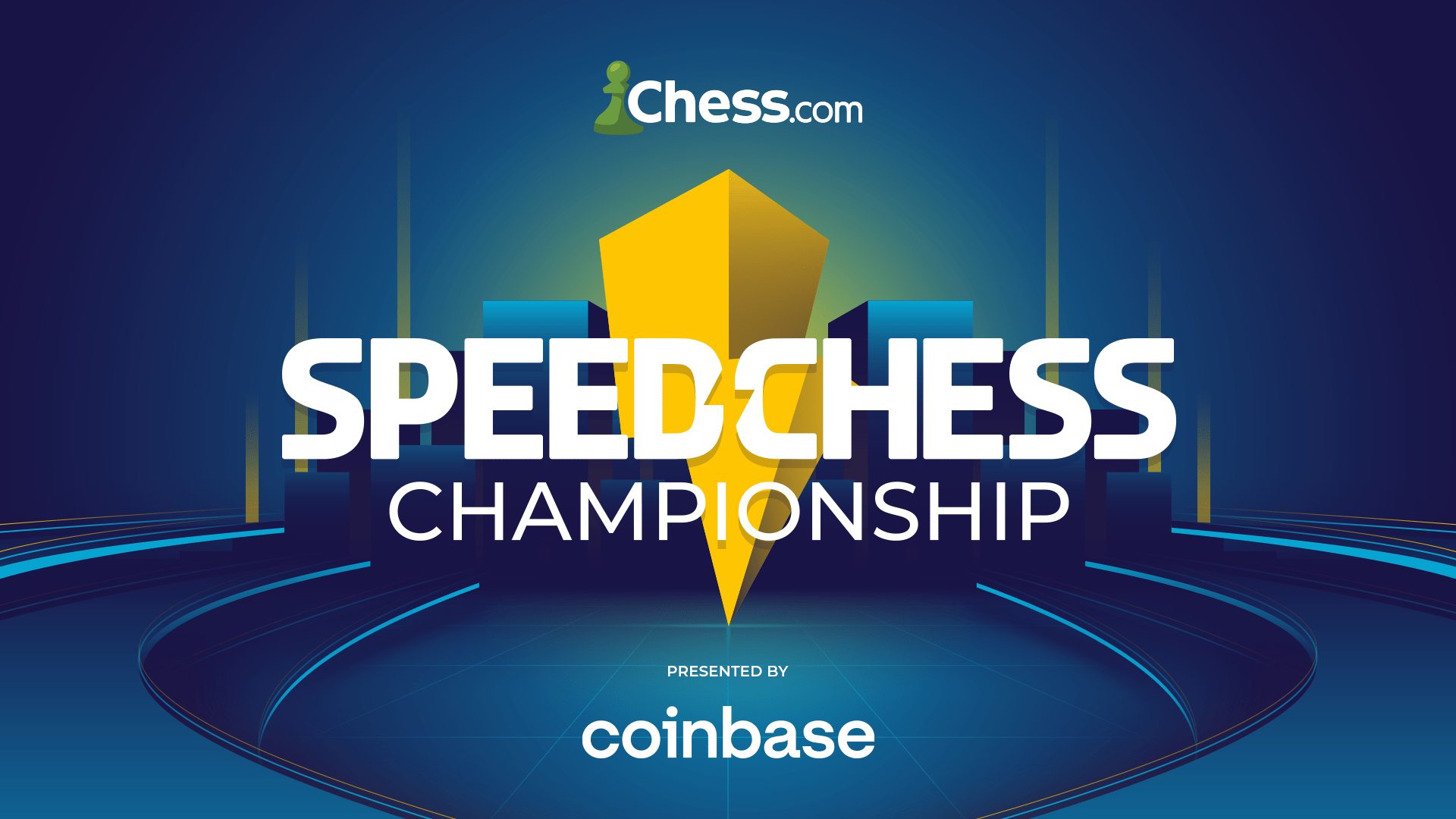
Speed Chess Championship: Nihal, Aronian Win To Advance To Quarterfinals
It was a doubleheader Thursday at the 2021 Speed Chess Championship Main Event with two matches: GM Alexander Grischuk vs GM Nihal Sarin followed by GM Levon Aronian vs GM Daniil Dubov. Nihal upstaged Grischuk impressively and will face GM Richard Rapport in the quarterfinals, while Aronian defeated Dubov in a dramatic encounter and will play GM Ding Liren. (QF schedules to be announced).
Nihal's youthful resourcefulness and Grischuk's uneven internet connection were the main factors in the young Indian's triumph over his higher-seeded opponent. The 15.5-10.5 score was the biggest winning margin of all the round of 16 matches in the event so far.
Aronian looked even more impressive in match two of the day as he built up a lead of 12.5-5.5 after the 5+1 and 3+1 segments. Dubov, too, suffered from a poor internet connection and painful losses as a result. He bravely attempted a resurgence in the final 1+1 segment but still fell short of catching up with Aronian, who won with a final score of 15-12.
Both Grischuk and Dubov played their matches from Slovenia, where they form the top two boards for Russia in the upcoming European Team Chess Championship 2021. According to match regulations, the players are responsible for their internet connection but unfortunately for the two Russian participants, their hotel internet wasn't as stable as they would have hoped for.
The games of the 2021 Speed Chess Championship Main Event are played on the Chess.com live server. They are also available on our platform for watching live games at Chess.com/events and on our apps under "Watch." Expert commentary can be enjoyed at Chess.com/tv.

The back-to-back live broadcast of the two matches.
Grischuk vs Nihal Nihal upstaged the higher-seeded Grischuk with an impressive 15.5-10.5 score.
Nihal upstaged the higher-seeded Grischuk with an impressive 15.5-10.5 score.
Grischuk vs. Nihal was easily one of the most awaited matches of the round of 16. While the higher-seeded Russian grandmaster has been an accomplished blitz player for decades, Nihal is one of the most promising young talents of the world right now, rated near the top of the leaderboards in both blitz and bullet formats at Chess.com.
This was also a 'match of the generations' in a way, with the 38-year-old Grischuk facing the 17-year-old Nihal, a long 21 years separating them in age. The Smarterchess predictions at the beginning of the match were pegged at 52 to 48 percent in Grischuk's favor, but the real picture was obviously much more complicated and exciting.

Blitz 5+1: Grischuk-Nihal 2.5-6.5
The match seemed to be going on an 'even' path until game three, White winning each game. Grischuk was leading against Nihal 2-1 at this point, and both the players didn't even seem to be anything spectacular to achieve those wins. Especially impressive was the ease with which Grischuk won game three, where he trapped his opponent's queen in the middle of the board effortlessly:
But game four became the turning point of the segment, embarrassingly not just for sporting reasons.
Jumping ahead, Grischuk pointed out the exact moment when everything went wrong in the match, which was when his clock ran for 20 seconds and he lost on time:
"I lost [with a] minus-five [score], so you cannot speak about one moment or one game - Nihal won with considerable advantage. But this game... I lost half a point because I had 20 seconds [left] in the game and a much better position in the endgame. I played terribly for the next five games. I could not concentrate, as any second [the internet connection] could go down."
Grischuk's comments are significant when one considers that Nihal scored 4.5 points from the remaining five games of the segment, finishing with a score of 6.5-2.5. Grischuk never recovered from this setback.
To give credit to Nihal, his most impressive effort came from game eight, where he exhibited one of his best abilities on a chessboard: spotting tactical opportunities involving sacrifices and entering them boldly:
Blitz 3+1: Grischuk-Nihal 4.5-3.5
Though faced with a daunting task, Grischuk began his retaliation from this segment onward, building up many impressive positions, only to see Nihal, time and again, save them with quick play and resourcefulness. A characteristic example would be the second game of the segment, where Grischuk had gained a simple winning advantage of two pawns and would have converted it to a win on a regular day. But, starting on the 28th move, Nihal played with admirable speed, consuming between only zero (!) to four seconds for every move until the rest of the game, and he escaped with a draw:
Still, Grischuk shortened Nihal's lead to 7-10, setting up a much-anticipated fight in the 1+1 segment.
Blitz 1+1: Grischuk-Nihal 2.5-5.5
By this point, Grischuk's problems with the internet seemed to have settled down, and he seemed to be fine with his connection. He began his campaign with a brisk 2.5-0.5 initial score, thus limiting Nihal's lead in the match to just one point at a total score of 9.5-10.5. And here came the crucial game four:
Taking it a notch further, Nihal repeated the pawn sacrifice on b5 again and even earlier on game six, completely unsettling Grischuk and winning the game quickly:
Commentators GM Daniel Naroditsky and GM Robert Hess were understandably left speechless by 19.Na1!
There is a theory by GM Jan Timman about match-play against a single opponent rather than against multiple opponents (i.e. in Swiss or a round-robin tournament). Timman emphasized the concept of playing for a fight when playing a match of multiple games against the same opponent, showing a willingness for a battle rather than playing 'correct' moves to prove the logic behind one's ideas.
Going by that theory, Nihal's willingness to be bold and to take huge risks enabled him to withstand Grischuk's vengeance in the final games of the match, which Nihal deservingly won.

Though facing a formidable opponent, much was expected in this match from Dubov, another famed specialist in faster time controls. But just as Grischuk did in the previous match, Dubov too suffered from internet connection issues and had severe problems against Aronian from the beginning of their encounter. Although the "win probability" at the beginning of the match was pegged at 69 to 31 percent, this match, too, promised fighting games and excitement.

Blitz 5+1: Aronian - Dubov 5.5-3.5
Aronian seemed to dominate the match in the earlier stages, and game five was the best illustration of his ability to execute clear conceptual thinking, a specialty of his play:
Dubov was slow in his play, often lagging behind Aronian on the clock. He seemed to be warming up slower than Aronian for the format of play. But it was during game eight that the commentators and spectators could clearly notice there was something wrong with Dubov's internet connection:
It was understood by this point that Dubov was suffering from an internet connection issue, and it was difficult to comprehend the competitive aspect of the match. Was it even possible to analyze and understand the quality of the games when it was obvious that one of the sides was barely able to make the moves in real-time?!
Blitz 3+1: Aronian-Dubov 7-2
Aronian started with four straight wins off the bat and had a great moment in this segment:
Game seven in this portion once again brought Dubov's internet issues to the fore:
This was probably the game that broke Dubov's spirit, as it was difficult to battle with the internet as well as with an opponent who knew how to take advantage of the match's conditions. Looking at a dejected Dubov on the screen, bogged down with his internet issues, commentator Naroditsky came up with a brilliant one-liner: "A web-cam is worth a thousand words!"
A web-cam is worth a thousand words!
—Daniel Naroditsky
At the end of the segment, Aronian led 12.5-4.5, and victory in the match looked like a far-fetched chance for Dubov.
Blitz 1+1: Aronian-Dubov 2.5-6.5
Dubov's internet issues seemed to settle down during the break between the rounds, and he began a real comeback in this segment. His best grind was game four:
At the end of game six, the total score stood at13.5-10.5 in favor of Aronian, and Dubov seemed to have a real chance of recovering when game seven began:
This was the pivotal moment that won Aronian the match. Speaking after the match, he was his characteristic frank self:
"One-minute chess is NOT my thing! I [have] never played bullet [chess] out of desire. Over the board, I am much better [at bullet] rather than with the mouse."
Over the board, I am much better [at bullet] rather than with the mouse.
—Levon Aronian
All Games


The 2021 Speed Chess Championship Main Event is a knockout tournament among 16 of the best grandmasters in the world who will play for a $100,000 prize fund. The tournament will run November 8-December 19, 2021 on Chess.com. Each individual match will feature 90 minutes of 5+1 blitz, 60 minutes of 3+1 blitz, and 30 minutes of 1+1 bullet chess.
Find all information about the Speed Chess Championship here.
Previous reports:

